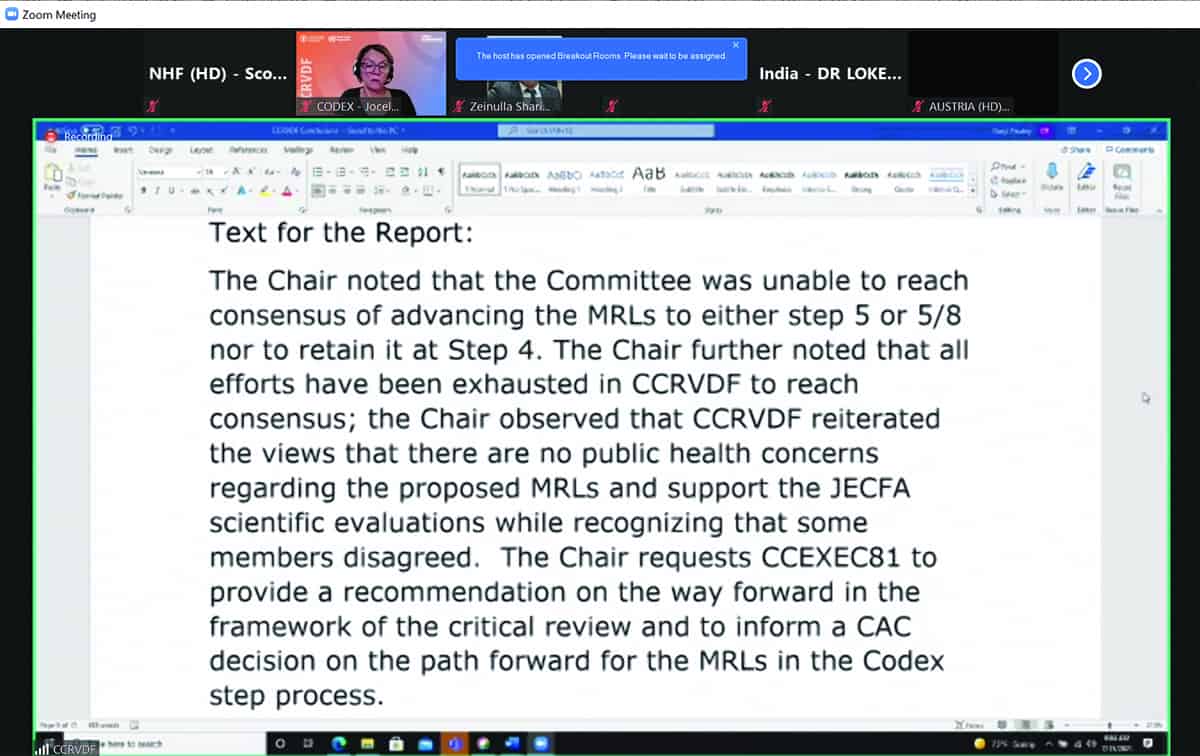Note: The views and opinions expressed here are those of the author (s) and contributor (s) and do not necessarily reflect those of the publisher and editors of WholeFoods Magazine.

On the third and fourth days (July 14-15, 2021) of the most recent session of the Codex Committee on Residues of Veterinary Drugs in Foods (CCRVDF), held online, the National Health Federation (NHF)—the only health-freedom advocacy organization accredited by Codex Alimentarius to participate at its meetings—helped the European Union, Switzerland, Norway, Russia, Kazakhstan, China, Thailand, Malaysia, Morocco, and Egypt withstand a concerted effort by Merck and its minions (Australia, New Zealand, Japan, USA, Canada, and all other Western-Hemisphere countries) to push the Zilpaterol standard much closer to adoption by the Codex Alimentarius Commission.
Zilpaterol
Zilpaterol is Merck’s special steroid-like veterinary drug for cattle, pigs, and poultry that unnaturally pushes them to make more muscle and less fat. It harms the animals who get it and it harms some of the humans who eat them. There is no therapeutic benefit whatsoever to the poor animals, only financial benefit to the vet-drug companies. And, yet, you should have seen some of the fierce emotions on display at this Codex meeting when country proponents of Zilpaterol pleaded with the Committee to push the Codex standard further up the 8-step approval process at Codex just so that Merck and others could make more dollars around the World. With such passion, you would have thought they were trying to save lives; but, no, it was only about the money.
This is at least the second time that NHF and its allies have defeated Merck and its Zilpaterol supporters at this Committee. (Read our full report of that previous victory and the Codex science representative’s personal attack upon NHF athttps://thenhf.com/2019/07/22/victory-at-codex-over-dangerous-vet-drug/.)
When called upon by the Chairman, I told the Committee that:
- Growth-promoting substances do not belong in animal husbandry and that many food companies—including Tyson and Merck itself—have had concerns about Zilpaterol causing health and behavioral problems with cattle (and Merck even pulled the product off the market);
- The residues in food can impact humans even at the levels currently determined by JECFA to be safe, causing tremors, heart palpitations, and other health issues;
- Zilpaterol’s use in horses has already been banned, so why are we trying to use it in cattle?;
- Being a catecholamine, Zilpaterol has been implicated as a contributory cause for increased bacterial problems coming off commercial feedlots these days;
- No risk assessment of this dangerous chemical compound has been done in connection with other vet drugs also given to food animals, so there is no information on the cumulative and synergistic effects on humans or animals from the drug residues of Zilpaterol and other drugs acting together;
- Consumers have the right to know and choose what they are consuming and Zilpaterol residues violate that right since they are not declared on the food;
- Codex is the sole Risk Manager here, so it’s entirely appropriate for it to accept or reject any risk assessment, for any reason whatsoever; and
- Given all of these problems with Zilpaterol, NHF would like to hear from Merck, the sponsor of this drug, on how Zilpaterol aligns with its Environmental, Social, and Governance (ESG) goals (especially given Merck’s announced commitment to the Precautionary Principle on page 14 of its latest ESG Progress Report).
On the other hand, New Zealand’s delegate—a relative newcomer to Codex—was spoiling for a fight with NHF, displaying his bad manners by insulting and demeaning NHF on the last meeting day (July 20) during the reading of the Committee Report by characterizing NHF as “unscientific” and not worth recording in the Report. And this, coming from a man who told the Committee that climate change results from cattle farts! With New Zealand’s Codex team having argued strenuously over the years at Codex that glyphosate, aspartame, aluminum, Zilpaterol, and GMOs are all safe while doses of Vitamin C above 60 milligrams/day and other important and vital vitamins and minerals above bare subsistence levels are unsafe, then we know we are dealing with some seriously scientifically challenged or morally compromised people.
The U.S. delegate, and the Merck front group misleadingly named “Health for Animals,” tried hard (along with New Zealand) to remove from the Report the last half of the last bullet-point comment (see above) that I made; however, thanks to the EU and the Codex Secretariat, the wording on the ESG goals remained in the Report.
Zilpaterol is already in use in most of those countries that argued in favor of a Codex standard for it, which includes the entire Western Hemisphere from Canada all the way down to Argentina and Chile. However, Australia, New Zealand, Uganda, and Senegal—all of whom hypocritically argued for a worldwide Codex standard for Zilpaterol—prohibit its use in their own countries, demonstrating once again that the Australian and New Zealand Codex offices are rogue agencies that answer not to their own governments but to their Big Pharma and Big Ag handlers.
Why is the Zilpaterol standard at Codex so important? If this Zilpaterol Codex standard were ever to be adopted, then Zilpaterol could flood the World markets. Merck could then force the EU, Russia, China, Switzerland, Norway, and many other countries to open their markets to Zilpaterol-tainted meat as well. And Merck would only be richer.
As NHF argued several times at the Codex meeting: “You cannot get healthy people from eating unhealthy food.”
Glyphosate
The very next week, beginning on July 27, 2021, a second virtual Codex committee meeting was held, this one by the Codex Committee on Pesticide Residues (CCPR). Hosted by the Chinese government and chaired by Professor Xiongwu Qiao, this is the important committee that considers setting pesticide residue levels in the foods that humans and animals eat.The first day of the meeting was tranquil, with the staff and delegates disposing of fairly perfunctory agenda items. However, on Day Two of the CCPR meeting, the National Health Federation—once again the only consumer group represented at a Codex committee meeting—spoke up against the following pesticides, fungicides, and herbicides as all posing public-health concerns: Pyflubumide, Chlorothalonil, Glyphosate, Buprofezin, Bifenthrin, Cyprodinil, Dicamba, Fluensulfone, and Tolfenpyrad.
Our objections to these toxins were not well-received by the Australian regional branch office for the pesticide companies (otherwise known as the Australian Codex Office), which several times tried to get NHF’s comments deleted from the record. When NHF objected to Cyprodinil as carcinogenic and referred the committee back to our previously filed written comments made to CCPR, Australia had the sheer audacity to object that our science had not been “approved by the Joint FAO/WHO Meeting on Pesticide Residues” (JMPR)!
Then, piling on top of NHF to add weight to Australia’s absurd argument were CropLife International (an admitted front-group for the pesticide industry—cute name though), the drug-happy World Health Organization, Uganda, and Kenya. When I was recognized to speak a second time to address the committee, I told them all what nonsense their argument was, that NHF has attended numerous different Codex committee and commission meetings over the last 20-plus years and had never seen such a nonsensical argument made, and that no one needed rubber-stamp approval from JMPR or JECFA to argue science at any Codex meeting, or to ask that that science be mentioned in the Report of the meeting. Any concerns, I continued, could be addressed in the Report by starting out the sentence with something like “The NHF stated its view that ....” I ended up by asking the Codex Secretariat to confirm what I was saying and then by telling Australia and the others that they should be ashamed. The Codex Secretariat did, in fact, confirm what I said and thanks to it, and the very fair CCPR Chairman, NHF’s comments will be in the Report.
Speaking of captured regulatory agencies, on the international stage, I have long argued that Australia and New Zealand are two of the worst of the whole lot. They do not represent the interests of their citizens, certainly not their health; but they both do a great job of promoting the interests of the big pharmaceutical, agricultural, and pesticide interests. As I have said before, if you one day just happened to stroll into a Codex meeting and knew nothing about what was being said or done, all you would have to do is adopt the exact opposite position to that espoused by Australia and New Zealand and you could be 99% sure that you were taking a position on the side of good health. (I wrote an article about Australia on this, which you can read by going tohttps://thenhf.com/codex/our-work-at-codex/the-great-australian-health-mystery/).
The saddest part of this meeting, though, is not the sheer ignorance and vindictiveness of the Australian, Ugandan, Kenyan, and CropLife delegates (and I rather suspect that they are all new to Codex meetings), but that NHF was the only one out of the 389 people present to speak out against any Codex approval of glyphosate. Yes, the European Union delegate did reserve the EU’s rights to not accept the Maximum Residue Levels (MRLs) for glyphosate within the EU; but there was no general objection to this incredibly toxic poison being approved at all by Codex.
Interestingly enough, the 70-registered-participant-strong CropLife delegation felt so threatened by NHF’s one-man delegation and NHF’s arguments against glyphosate that on July 28, this pesticide-industry front group felt obligated to make the following speech in response to NHF’s comments about glyphosate the previous day:
On behalf of the sponsor, we would like to make a statement with regard to the advancement of glyphosate CXLs to step 5/8. All regulatory authorities around the World routinely evaluate the safety of glyphosate. No regulatory authority in the World has classified glyphosate as an endocrine disruptor. It is undergoing review in the EU. In June 2021, the draft renewal assessment report concluded that glyphosate did not meet the ED criteria as laid in the regulation. We invite all the CCPR delegates to take advantage of the Transparency website that can be found at https://www.glyphosate.eu/, where the EU glyphosate submission and other related materials (such as individual study reports) can be accessed.
Well, I thought my razor was dull until I heard this speech. The science condemning glyphosate and its toxic and carcinogenic effects is extensive. (See, e.g., https://www.greenmedinfo.com/article/neonatal-exposure-glyphosate-based-herbicide- alters-uterine-differentiation-prandhttps://www.figo.org/removal-glyphosate-global-usage.) And as I also told the Committee, glyphosate in formulation with other ingredients (such as arsenic in RoundUp) is up to a thousand times more toxic, and, as such, we should be dealing with real-world products and not just isolated ingredients.
Battered by costly lawsuits around the World, Monsanto’s parent company Bayer AG just announced at the end of July 2021 that it will remove its glyphosate-based products from all retail store shelves no later than 2023, in its bid to head off future lawsuits resulting from consumer use of the herbicide. The company said that it intends to replace glyphosate with “new formulations that rely on alternative active ingredients.” Of course, Bayer still denies that it has any safety concerns about glyphosate, claiming instead that the product’s removal is only “to manage litigation risk.” Well, we shall see. There is no place on Earth for glyphosate and it needs to go.WF










